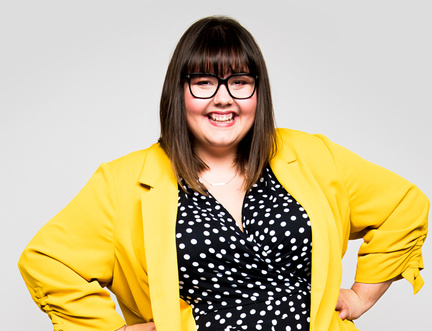More articles Sunday 18 August 2019 1:30pm
“We’re fat, you can’t silence it,” says Sofie Hagen

Vocal inclusivity activist and comedian Sofie Hagen appeared at the Edinburgh International Book Festival to discuss her book Happy Fat, the process of loving your body and why she prefers fat activism to body positivity.
“It was a lot of me being very, very angry... because I was just furious, like throughout writing it. When you come to terms with, when you start to think about how much the world hates you because of your body. You suddenly start to feel a bit weird about having it called Happy Fat, because no, I’m furiously fat. A thing happened while I was writing the book, which was, I became too fat for the world.”
For Hagen, a big part of her outlook in life is to be unashamedly fat, to not shy away from the word and to recognise the weight it holds with other people. When discussing her thin friends who fall into the trap of trying to downplay the size difference in sharing clothes, she said, “I’m fat Karen, and now I’m wearing your skirt as a headband.”
“We’re not really allowed to talk about fat, you know, that’s one of the weird things about this, is that if you’re fat, you’re constantly being told that you’re not fat. Meanwhile you can’t fit into things. So, it’s this weird kind of gaslighting thing of being like, ‘no, no you’re not. Don’t say that, don’t say that word. You’re voluptuous or rotund, or soft, or you’re fluffy’. So many words that, I’m just, it’s fat. Like it’s a descriptive neutral word describing fatness and we don’t get less fat by not saying the word fat. We don’t get less fat from wearing black or vertical stripes or shapewear. We’re fat. You can’t silence it.”
One of the other issues that fat women face, are the misconceptions that they’re under- or over-sexed, matronly or willing to be a receptor for other people’s emotional issues.
“There’s this idea that fat people don’t have sex. That we can’t…. We’re very desexualised. If you see any movies on TV or anything like that, fat people are never portrayed as sexual. We’re either portrayed as completely desexualised, some just aren’t sexy. Don’t have sex, don’t think about sex, or, we’re hypersexualised and we’re like a predator.
“So, that’s sort of what we’re fighting against. People assume we don’t have sex, and we do.”
When speaking about how she prefers to work under the label of ‘fat activism’, rather than ‘body positivity’, because, “Body positivity is the idea that you should learn how to love your body and I don’t believe that’s certainly the case. That’s very hard to say. Fat Activism, is what I subscribe to and I identify as a fat activist, is about them never being allowed to teach you to hate your body.”
“From the minute we’re born, there’s children up to the age of three who have been taught to hate their bodies. Half of the kids between the ages of six and eight have been on diets. The statistics are really, really gruesome and then kids are taught that you cannot be fat, you cannot be fat. That being fat is the worst thing you can be, and then maybe when they get to the age of being a teenager, maybe an older teenager that’s when they can go on Instagram and realise, ‘maybe I can love my body’. But then it’s too late and then they’re going to spend the rest of their lives trying to overcome that.
“That’s a waste of life, when actually what we could have done was just never teach them to hate their bodies in the first place.”
The topic ran to health and the constant questions Hagen gets as a fat woman about her health and the health of fat people while doing press for the book, saying she used to be nice but now, “I’m not nice about it. The amount of times I get asked about health… and people don’t ask about health, oh so, people go ‘well what about health?’ What they mean is, how dare you tell people to love their bodies because fat is always unhealthy. Which is not the same thing. You can love your body even if it’s unhealthy.”

 Major new partnership with Celtic Connections
Major new partnership with Celtic Connections 

